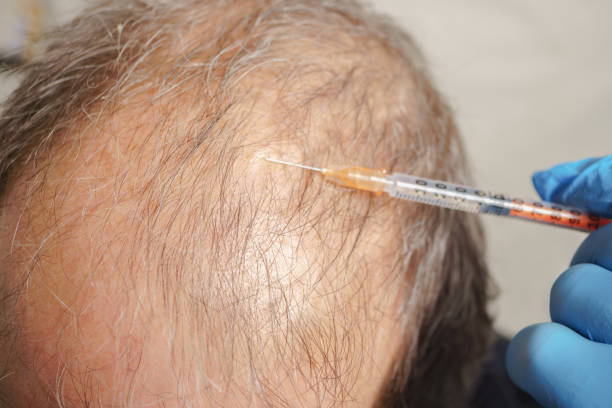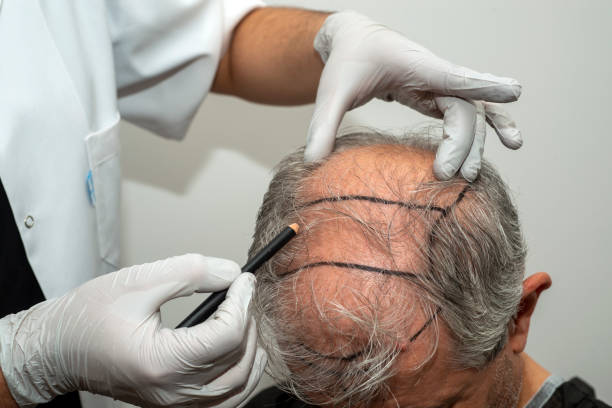Hair loss can be a distressing experience for many individuals. If you’re looking to grow lost hair, it’s essential to understand the causes behind alopecia, explore preventive measures, and discover effective solutions. We will delve into the topic, providing you with valuable insights on how to address baldness and promote regrowth. Let’s explore the various factors contributing to alopecia and the innovative technologies, including transplantation, that can help you regain your confidence and a full head of hair.
Causes of Hair Loss:
Genetic Predisposition: One of the primary causes of alopecia is genetics also known as growing hair loss. Androgenetic alopecia, commonly known as male or female pattern baldness, is an inherited condition that affects both men and women. It is characterized by a gradual thinning of the follicles, leading to alopecia over time. Individuals with a family history of baldness are more likely to experience it themselves.
Hormonal Imbalances: Hormonal changes can play a significant role in baldness. Imbalances in hormones such as androgens (e.g., dihydrotestosterone or DHT) can cause follicles to shrink, leading to shorter and finer growth cycles. Hormonal changes can occur due to factors such as aging, pregnancy, childbirth, menopause, or certain medical conditions.
Lifestyle Choices: Certain lifestyle choices can contribute to alopecia. Factors such as excessive stress, poor nutrition, smoking, and excessive use of hairstyling products or heat treatments can damage follicles and lead to alopecia. Additionally, tight hairstyles like ponytails or braids, when worn frequently, can cause traction alopecia, a type of alopecia due to excessive tension on the hair.
Medical Conditions and Treatments: Various medical conditions can trigger baldness. Conditions such as thyroid disorders (hypothyroidism or hyperthyroidism), autoimmune diseases (like alopecia areata), scalp infections, and certain skin disorders can result in alopecia. Additionally, undergoing treatments like chemotherapy or radiation therapy for cancer can cause temporary baldness.
Nutritional Deficiencies: Inadequate intake of essential nutrients can impact hair health. Deficiencies in vitamins (such as vitamin D, B vitamins, and biotin), minerals (such as iron and zinc), and protein can weaken follicles and disrupt the growth cycle, leading to hair loss. Understanding these causes of alopecia is crucial as it helps individuals tailor their approach to regrowth. By identifying the underlying cause or combination of factors contributing to baldness, individuals can choose appropriate preventive measures and targeted treatments to promote regrowth effectively. It’s important to note that consulting with a healthcare professional or a trichologist can provide a more personalized assessment of the specific causes of alopecia and guide you in developing a comprehensive regrowth strategy.
Preventive Measures for Hair Loss
Maintain a Healthy Diet: When aiming to grow lost hair focus on incorporating foods that are beneficial for growth. A balanced diet rich in essential nutrients like vitamins, minerals, and proteins plays a vital role in promoting health and preventing hair loss.
Gentle Hair Care: Adopting a gentle hair care routine, including proper shampooing, conditioning, and avoiding excessive heat or chemical treatments, can minimize damage.
Stress Management: High-stress levels can contribute to alopecia. Implementing stress management techniques, such as exercise, meditation, or therapy, can positively impact growth.
Innovative Solutions for Hair Regrowth
1. Hair Transplantation: With advancements in technology, transplantation has become a popular and effective solution for grow lost hair. This procedure involves the extraction and transplantation of follicles from the donor area to the recipient area, ensuring natural-looking results.
2. Laser Therapy: Low-level laser therapy (LLLT) is a non- invasive treatment option that stimulates hair follicles, promoting regrowth. This innovative technology can be used in the comfort of your own home or through professional treatments.
3. Topical Solutions and Medications: There are FDA- approved topical solutions and medications available that can help slow down alopecia and promote hair regrowth. One commonly used topical solution is minoxidil, available over-the-counter. It is applied directly to the scalp and stimulates follicles, promoting hair growth. Another medication is finasteride, an oral prescription medication that blocks the conversion of testosterone to DHT, helping to prevent further baldness and potentially promote regrowth in some individuals.
4. Nutritional Supplements: Nutritional supplements formulated with vitamins, minerals, and other scalp- supporting ingredients can complement regrowth efforts. Biotin, zinc, iron, vitamin D, and omega-3 fatty acids are some nutrients known to support healthy growth. However, it is important to consult with a healthcare professional before starting any supplements to ensure they are suitable for you and to determine the correct dosage.
5. Scalp Micropigmentation (SMP): SMP is a non-surgical cosmetic procedure that uses specialized pigments to create the appearance of a closely-shaven head or denser hair by adding tiny dots to the scalp. It can help camouflage areas of thinning or baldness, giving the illusion of fuller hair. Remember, the effectiveness of these solutions can vary depending on individual factors such as the extent of hair loss, underlying causes, and overall health. It is advisable to consult with a qualified healthcare professional or restoration specialist to assess your specific condition and determine the most suitable treatment options for your hair regrowth journey.
Natural Approaches to Hair Regrowth at Home
While professional treatments and medical interventions can be effective to grow lost hair, there are also some home remedies that may help promote healthier hair growth. Here are a few home remedies that you can consider:
Essential Oils: Some essential oils have been associated with promoting hair growth. For example, rosemary oil, peppermint oil, lavender oil, and cedarwood oil are believed to have stimulating properties.
Aloe Vera: Aloe vera has soothing and moisturizing properties that can help maintain a healthy scalp. Apply fresh aloe vera gel directly to your scalp and leave it on for about an hour before rinsing it off.
Onion Juice: Onion juice is rich in sulfur, which is believed to stimulate follicles and promote hair growth. Extract the juice from an onion seeds and apply it directly to your scalp. Leave it on for 15-30 minutes before rinsing it off with a mild shampoo.
How do you grow your hair faster than ever?
Conclusion
In conclusion, growing lost hair is a journey that requires patience and informed decision-making. By following the guidelines outlined above, you can take charge of your hair health and work towards achieving a fuller, healthier head of hair. Remember to consult with a qualified professional to determine the best approach for your specific hair loss situation.
People also search
| PRF treatment | 3100 grafts before after |
Grow lost hair in Lahore | Call or WhatsApp | +923334309999



